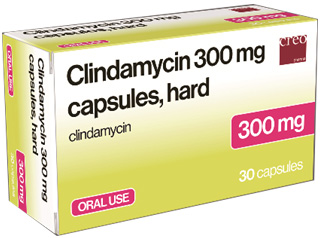Clindamycin is an antibiotic used to treat many bacterial infections: skin and soft tissue, bone and joint, respiratory, genital and other infections. Antibiotics can also be used as part of a complex treatment, but only on a doctor’s recommendation. They are prescribed depending on the symptoms, the severity of the disease and the medication taken.
You can buy Clindamycin at the lowest prices in United Kingdom at our online pharmacy, fast delivery throughout the country, possibility to buy medicines without prescription and good service for our customers!
Where To Buy Clindamycin In United Kingdom
We offer our customers a great opportunity not to waste time and order medication online at our online pharmacy. This makes it much easier to buy the right medication and start the treatment as soon as possible.
Medicines Without Prescription From An Online Pharmacy
To obtain over-the-counter medications, simply fill out an online order form; if necessary, you will be consulted and your order will be delivered to you as soon as possible.
Affordable Drug Prices
The price of medicines on our website is much more favourable than in the pharmacy, so when you buy a medicine from us, you will see how cheap it is, but not inferior in quality.
Anonymity
Your order will certainly be anonymous and secure; we have made sure that you do not have to worry about the security of your data and that you can buy the goods cash on delivery. Another great advantage will be the fast delivery anywhere in United Kingdom.
What Is Clindamycin?
Clindamycin is an antibacterial capsule prescribed for the treatment of various infections in the body. The main active ingredient, clindamycin hydrochloride, is active against bacteria that cause infections of the lower respiratory tract, skin, ear, throat, nose, genitourinary tract, etc. Available in 150 mg and 300 mg doses, the dose is chosen according to the severity of the disease, age and the medication (including generics) the patient is taking. The drug is not used in infections caused by viruses, meningitis.
Indications For Administration
Clindamycin is indicated for bacterial infections of bones and joints, skin and soft tissues, lower respiratory tract, pelvic and abdominal area, scarlet fever and genital infections, and infections of teeth and jaw. Clindamycin is sometimes used to treat bacterial infections as an alternative to penicillin preparations if the patient is allergic to penicillin.
Clindamycin Dosage and Use
Clindamycin capsules should be taken with plenty of water. The daily dose is divided into 4 doses. Depending on the severity of the disease, adults and children over 14 years of age are prescribed 0.6 to 1.8 g per day (4 to 12 capsules of 150 mg). For patients with liver or kidney disease, the dose of clindamycin is not reduced by taking one capsule every 8 hours, but it is important to monitor the patient’s condition.
For children under 14 years of age, clindamycin is prescribed at a dose of 8-25 mg per kilogram of body weight:
- 20 kg – 450 mg;
- 30 kg – 600-750 mg;
- 40 kg – 600-900 mg;
- 50 kg – 600-1200 mg.
The daily dose should be divided into 3-4 doses and the drinking regime should be followed during treatment.
Overdosage
No cases of overdose have been observed, but gastric lavage is required if necessary; no data on an antidote are available.
Contraindications to Clindamycin Administration
Do not use the capsules in patients with hypersensitivity to clindamycin, lincomycin or other ingredients of the medicinal product. Clindamycin is also not prescribed in case of meningitis and in children under six years of age.
Caution is advised when the drug is prescribed in the following cases:
- liver and kidney diseases
- gastrointestinal diseases;
- atopy;
- asthma;
- allergic reactions.
Clindamycin is not used for the treatment of viral respiratory tract infections and in cases of galactose intolerance, lactase deficiency or impaired glucose-galactose absorption syndrome.
Side effects
The following possible side effects have been reported during clinical studies: pseudomembranous colitis, vaginal infections, fever, drowsiness, headache and dizziness, stomatitis, diarrhoea, nausea, vomiting, stomach pain, urticaria, dermatitis, oedema, renal and hepatic dysfunction, fungal infections, allergic reactions. If you suddenly notice these or other unpleasant symptoms and feel unwell, you should stop taking the product and inform your doctor.
Special Information
During pregnancy, the expected benefits of clindamycin treatment must always be weighed against the risks, as the drug crosses the placenta. Clindamycin is not recommended during lactation.
There are no effects on fertility or on the ability to drive or use machinery. However, in case of discomfort or alarming symptoms, it is recommended not to drive and to consult a doctor.
Compatibility of Clindamycin with other medicines
Clindamycin may increase the effects of muscle relaxants and should therefore be used with caution.
The compatibility of Clindamycin with oral contraceptives has not been studied, so additional methods of contraception should be used during treatment.
Clindamycin Tablets OR Gel
Clindamycin is available in several dosage forms: external gel, capsules, topical solution, solution for injection, vaginal cream and vaginal suppositories.
Clindamycin gel is used for the topical treatment of acne, while the field of action of capsules is much broader and they are prescribed for infections of various organs. Therefore, before treatment, it is always necessary to consult a specialist about clindamycin therapy and the symptoms of the disease in order to identify the most effective treatment.


